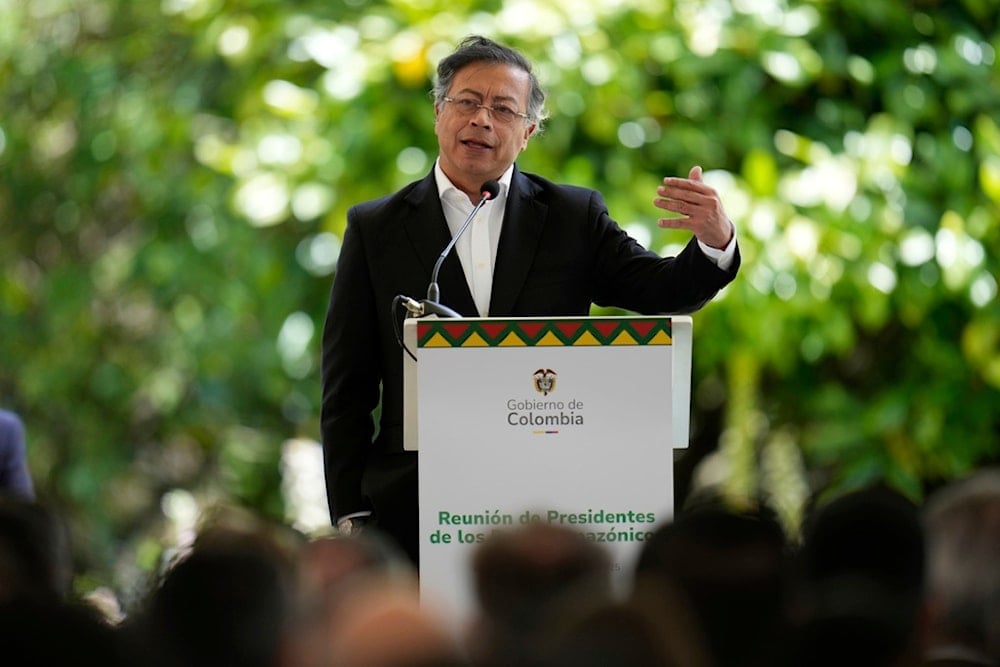US adds Colombia to drug list, drawing Petro’s rebuke
Washington’s rare decertification of Colombia over drug efforts risks straining ties and complicating cooperation on security and rural development.
-

Colombia's President Gustavo Petro speaks during a meeting of leaders of the Amazon Cooperation Treaty Organization in Bogota, Colombia, August 22, 2025. (AP)
Colombian President Gustavo Petro condemned Washington’s decision to downgrade Colombia’s cooperation in the global fight against drugs, calling it punitive and unjust.
During a televised cabinet meeting, Petro, who has often argued that alcohol causes more harm than cocaine, said Colombia was being punished despite sacrificing “dozens of policemen, soldiers, and regular citizens” to stem the flow of narcotics to the United States.
“What we have been doing is not really relevant to the Colombian people,” he stressed. “It’s to stop North American society from smearing its noses” in cocaine.
The rebuke followed the Trump administration’s move on Monday to label Colombia as failing to fully cooperate in the international drug fight, the first such step against the longtime partner in combating drugs in nearly 30 years.
Officials cited a surge in coca cultivation and cocaine production, but critics argue the measure unfairly targets Bogota despite its decades of collaboration with Washington.
Analysts note that “decertification” is a rare and blunt diplomatic tool. Adam Isacson, a security researcher at the Washington Office on Latin America, said, “Decertification is a blunt tool and a huge irritant in bilateral relations that goes well beyond drug issues and makes cooperation far harder in any number of areas.” He added that its rarity explains why it is seldom invoked.
Historical context: Colombia’s last decertification in 1997
The only prior US decertification of Colombia occurred in 1997, at the height of cartel power when drug networks had deeply corrupted national institutions. Then-President Ernesto Samper faced accusations of taking illicit campaign money from the Cali cartel; one plane intended to carry him to a UN session was found carrying heroin.
Following Samper’s presidency, successive US administrations reportedly poured billions into Colombia to eradicate coca, strengthen security forces against drug-fueled rebels, and provide alternatives to impoverished farmers. Those programs underpinned a long period of cooperation between Bogotá and Washington.
The cooperation frayed after aerial spraying of coca with glyphosate was suspended following a Colombian court ruling. A 2016 peace accord with the FARC shifted policy toward rural development and voluntary crop substitution rather than punitive eradication. Since then, coca cultivation has soared: coca land nearly tripled in the past decade to a record 253,000 hectares in 2023, according to the UN Office on Drugs and Crime. That area is nearly three times the size of New York City.
Drug seizures have also climbed sharply, with Colombia seizing 654 metric tons so far this year after a record 884 metric tons last year.
Slowing eradication under Petro
But manual eradication under President Petro has slowed markedly. The government uprooted just 5,048 hectares this year, a fraction of the 68,000 hectares cleared in the last year of his conservative predecessor’s administration and far below Bogota’s own 30,000-hectare target.
A former rebel himself, Petro has clashed with senior US officials over extradition refusals and his criticism of US policies on immigration and narcotics. After a deadly US strike on a Venezuelan vessel, the administration alleged carried cocaine, Petro stated: “Under my administration, Colombia does not collaborate in assassinations.”
In a memo to Congress, Trump blamed Colombian political leadership, “The failure of Colombia to meet its drug control obligations over the past year rests solely with its political leadership,” he wrote, and warned he would reconsider the designation if Colombia took tougher action to eradicate coca and cooperate to bring criminal leaders to justice.
Although the US found Colombia noncompliant, the administration issued a waiver so sanctions tied to the designation would not immediately trigger, citing vital US national interests. Still, analysts warn the move risks damaging the bilateral relationship and hampering Colombia’s economy and rural security efforts.
Wider regional designations and military actions
Alongside Colombia, the US listed Afghanistan, Bolivia, Burma, and Venezuela among 23 major drug transit or production countries it deems noncompliant. For most, Washington again cited national interests in waiving sanctions.
The redesignation of Venezuela was announced amid an expanded US military presence in the Caribbean, which has already included strikes on small Venezuelan vessels Washington claims were ferrying cocaine to the US.
“As the designation stated, ‘In Venezuela, the criminal regime of indicted drug trafficker Nicolás Maduro leads one of the largest cocaine trafficking networks in the world,’” the Trump memo said, vowing continued efforts to hold Maduro and other figures accountable.
The US has said it will reconsider the designation if Bogota steps up eradication, improves cooperation, and prosecutes those leading criminal organizations. Meanwhile, analysts and Colombian officials are watching closely, warning that the decision could complicate multiple areas of US–Colombian cooperation and fuel political tensions at home.
Read next: Latin American peace, anti-imperialism, and Gaza at the heart of CELAC

 5 Min Read
5 Min Read










